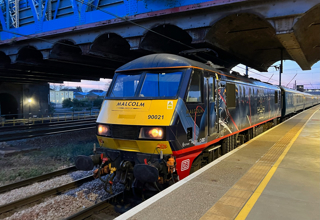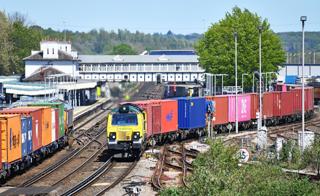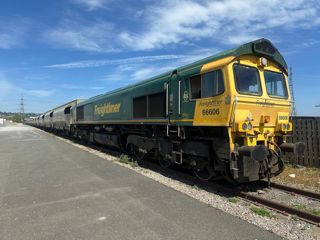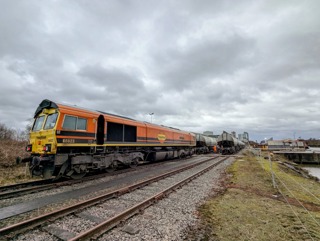With a new Prime Minister, a new Secretary of State for Transport, and (of course) a new monarch, the prospect of a change of government in Westminster feels rather more distant than it did during the dying days of Boris Johnson’s premiership this summer.
But the Conservatives have ranked in second place in every opinion poll in 2022 - and are now more than halfway through the maximum five-year term they secured following Johnson’s landslide victory in December 2019. After four terms of Conservative administration, the prospect of the next government being Labour-led appears more of a possibility.
If Liz Truss holds out until the latest possible dissolution date, which would leave us with an election in January 2025, Britain’s railways could be in a very different state to today.
Great British Railways, the new ‘guiding mind’ for the railways, absorbs functions from Network Rail, the Department for Transport, and the Rail Delivery Group. Franchising will be history, with the majority of train operating companies operated under the concession model. It also seems likely that more will follow the trajectory of Southeastern, Northern and LNER, and be returned to public sector operation.
But having shifted to unequivocal support for public ownership under Jeremy Corbyn, Labour’s policy for the railways has recently been thrown into disarray. Although party leader Sir Keir Starmer initially committed to “common ownership of rail, mail, energy and water”, he has now said that the COVID-19 pandemic means his leadership campaign policy package of “ten pledges” no longer stands. Mail, energy and water, at least, are considered too expensive to return to state hands.
Pressed on this issue on July 25, Shadow Chancellor Rachel Reeves told the BBC’s Today programme that public ownership of key utilities “just doesn’t stack up against our fiscal rules”.
But following a backlash from party colleagues and rail unions, the party briefed journalists that Reeves had not heard the mention of ‘rail’ in the interviewer’s question - and that Labour’s policy was still to take rail services back into public operation. A spokesman said there was a “positive role for rail in public ownership”.
However, just as clarity appeared to have been restored, Starmer himself muddied the waters. Asked at a press conference about Reeves’ comments, he told journalists: “I take a pragmatic approach rather than an ideological one, I agree with what Rachel Reeves said this morning.”
Labour’s Shadow Transport Secretary Louise Haigh then hit back, tweeting: “Labour is committed to public ownership of rail”.
Starmer then gave an interview to the Daily Mirror, apparently in order to clarify support for public operation of passenger services. But instead, he advocated for the status quo, stating: “Rail is probably different from the others because so much of our rail is already in public ownership. That is what I mean about not being ideological about it. Pragmatically, that is the situation, and it’s going to be the situation for some time to come.”
Now, a few months after this rather unfortunate day for policy co-ordination, the dust has settled somewhat. As this issue of RailReview went to press, Labour’s autumn conference was likely to reaffirm support for public operation, and the ‘opposition White Paper’ setting out the blueprint for this (developed by Andy McDonald, who served as Shadow Transport Secretary under Corbyn), remains on the party website.
Despite Starmer’s suggestion that the current arrangements are “going to be the situation for some time to come”, the party’s press office eventually clarified that it is still Labour policy to “bring our railways into public ownership as contracts with existing operators expire/as franchises end”.
A senior Labour source says that the Mirror interview was not about defending and extending the current system, but rather acknowledging that some of the work had already been done.
“What he meant is that it’s effectively been renationalised and there’s no point reprivatising it. And rather than a worst of both worlds where the state’s paying the bills and unable to fix the problems… the argument he’d be making is that in narrow bean-counting terms, you don’t need to be accounting for it in a ‘grey book’,” the source says.
“There was an instinctive cultural cringe of responding to a right-wing talking point by responding to a question by saying ‘oh, we won’t do that’. But I think it was a genuine cock-up rather than an attempt to tear up the policy.”
But does the party stand by the specific measures set out at the time Starmer took over?
The paper produced by McDonald - titled GB Rail: Labour’s Plan for a Nationally Integrated Publicly Owned Railway - comes with the caveat that it is a “proposed structure for discussion” and “may be considered as the Opposition equivalent of a White Paper presented for consultation”.
As well as a foreword by McDonald (who was re-shuffled to the employments rights brief by Starmer, before resigning in protest at the party’s reluctance to back a £15 minimum wage last year), the paper contains the contact details of his advisers Ian Taylor and Karl Hansen.
Both have now left the party’s employment, with Taylor returning to his permanent job at the consultancy Transport for Quality of Life, and Hansen now assistant editor of the left-wing quarterly Tribune. Another adviser to McDonald, former ASLEF policy chief James McGowan, is now head of public affairs for Porterbrook.
Jim McMahon, McDonald’s immediate successor in the opposition transport brief, spoke warmly of the document upon his appointment in 2020.
“We are working towards a Labour government in 2024, when we will be in a different place with the Government adopting the Williams review, and rail concessions will slightly change the landscape. But the principle is maintained, and the manifesto position has not changed,” he said in an interview with the ASLEF Journal.
“We have a clear way of getting there and an investment plan to support it. Will the policy on rail ownership get unpicked? Answer: No.”
Haigh, who took over as Shadow Transport Secretary in November 2021, has not made specific reference to McDonald’s paper, but she has repeatedly reaffirmed support for public operation.
That she did so immediately after criticism of the interventions in July from Starmer and Reeves will have probably annoyed some Starmer ultra-loyalists, but it is really no surprise - Haigh is associated with the ‘soft left’ of the party, and it is likely she was keen to draw a line in the sand before the flagship policy of her brief was diluted in the same way as Starmer’s other public ownership pledges.
Haigh also has a background in Labour’s affiliated trade unions, which have been pressing for the party to support the reversal of privatisation ever since Tony Blair declined to undo the work of his Tory predecessor John Major.
She is also a close ally of Labour deputy leader Angela Rayner, whose relationship with Starmer has (at times) been rather fraught. Rayner’s partner Sam Tarry served under Haigh as a party transport spokesman until July this year, when he was sacked by Starmer after appearing on an RMT and TSSA picket line. Tarry remains Labour MP for Ilford South, but (as of September) is facing a de-selection campaign from the Labour’s right wing, which (his allies say) is backed by the Starmer leadership.
GB Rail spans 103 pages and lays out plans for a “people’s railway” in granular detail. It is not just about ownership models - it specifies that “the next Labour Government must create a railway that looks very different to the present railway”, from improving passenger experience and a ticketing revolution to an expansion of freight and better planning. Its central thesis is integration: of track and train; of passenger services into one state-owned operator; and of rail with other modes of transport.
The reversal of passenger service privatisation would take place through “a gradual process of acquisition of franchised passenger services as they expire, or before where this would provide better value”.
GB Rail, the new ‘guiding mind’, would be run at arm’s length from the UK Government, and as such “would benefit from a two-tier board structure, with a supervisory board as well as a management board, as used in European publicly owned rail companies including Deutsche Bahn”.
On the future of the rolling stock companies (ROSCOs), GB Rail sets out the “guiding principle” of “a railway that owns its rolling stock”.
But this does not appear to amount to taking existing stock into public ownership, something which also would seem to conflict with the “fiscal rule” preventing water, energy and mail renationalisation set out by Reeves and backed by Starmer in July.
GB Rail instead advocates a “co-ordinated long-term programme of rolling stock procurement” which would “enable rolling stock assets to be specified, manufactured, deployed and maintained with maximum efficiency for the whole railway”.
As for freight, the document allows for more wriggle room. It calls for “a case-by-case review to determine the best ownership arrangements for the existing privatised rail freight operators”, which would “consider whether it would be cost-efficient to purchase all or some rail freight firms”.
Direct Rail Services, which is already state-owned through the Nuclear Decommissioning Authority, would become part of GB Rail and run by a new freight business unit that would also aim to maximise freight carriage by rail. But to ensure DRS would not get preferential treatment, the document suggests establishing “Chinese walls” within the national rail company.
As well as leading the union representing the vast majority of Britain’s train drivers, ASLEF General Secretary Mick Whelan chairs Labour Unions, the organisation which facilitates the sometimes-uneasy relationship between the Opposition Party and its affiliates.
Speaking to RailReview, Whelan is confident that the principles of GB Rail remain party policy: “The Green Paper was ready to go. Andy McDonald had done it, the Tories cribbed a few bits off it like the title, but it was going to be a public service - with a public service ethos and with trade unions and others on the board.
“It’s one of the few keynote policies that hasn’t been altered by the reneging on the ten pledges or the other stuff that’s gone on, allegedly because of the pandemic.
“I think there’s also a belief that the Tories have done half the work with their getting ready for GBR. In an island this size, you can’t deliver Kyoto, you can’t deliver Paris unless you put mass freight, mass passenger - and integrated transport, not just railways - at the heart of what you’re doing.”
Whelan recognises, however, that the party’s emphasis has been “on the nationalisation of the passenger side”. And he wants it to go further: “At some point in the future, I do think we’ve got to fight for a policy where the whole railway comes under one banner, and we plan it in the proper way.”
He is particularly critical of the rolling stock companies, which McDonald said had “got away with murder”, in an interview with RailReview in 2019.
“You know, the ROSCOs didn’t lose any money and didn’t cut any cloth during the pandemic - even though we had reduced ridership and less money coming into the industry,” says Whelan.
In Haigh, the ASLEF leader clearly sees an ally: “We’re hoping that in future, what we tend to see in Louise Haigh, that the Labour policy will move in the right direction. I think the real problem we’ve always experienced will be the fact that mass policy, housing, the NHS. is always going to come first. But as long as it comes, I don’t care.”
So, how does he think Starmer and Reeves ended up appearing to renege on Labour party policy? “The real problem is: in public they misspoke, and they came to us and said they had misspoken and they did it quite quickly. If they hadn’t come to us at all, I’d be concerned. The real problem is when people misspeak, people don’t see the rowing back.”
Haigh was not available for interview, but McDonald says she is holding firm to GB Rail.
“My understanding is that it holds entirely, and that it would be implemented by an incoming Labour government,” he says in an interview with RailReview.
“We’ve seen in the last months, especially in this volatile industrial environment, that the public are overwhelmingly in favour of bringing the railway into public ownership.
“It speaks to the needs and demands of the public. It’s not a surprise therefore that it remains Labour party policy. I’m sure that my successors have taken this document on board - in fact, I’ve had discussions directly with them about it, and they remain committed to seeing its implementation.”
Is McDonald concerned that the more expensive parts of the plan, such as the public operator procuring rolling stock and potentially running freight operations, could fall victim to Reeves’s “fiscal rule”?
“There’s clearly a live discussion ongoing about Keir and his commitments when he stood for the leadership, in terms of rail, mail, water and energy, and that’s caused some tensions at the very least.
“Keir is right to reaffirm the commitment to public ownership of the railway. And on the issue of costs, he’s right again that the capital expenditure we’re talking about doesn’t really frighten the horses. Because we’re talking about bringing the operation of the railways back into public ownership, which is simply allowing franchises as they were to fall into default over the passage of time.”
McDonald believes this will be an equally (if not more) applicable model once franchising has given way to the concessions system: “The costs there are minimal.”
As for rolling stock arrangements, he believes that state ownership will save money in the medium and long terms - although GB Rail does not include a commitment to buying out existing stock or abolishing the ROSCOs.
“My position was that we are where we are, and that rolling stock companies had morphed into not just financial deals and leasing arrangements, but into technology. But if we could draw a line under paying through the nose for leasing the trains, that would be a step in the right direction.”
McDonald also believes that Brexit will give an incoming Labour government more opportunity to shake up the railways - as Britain will no longer be bound by EU directives which stipulate open access and the separation of track and train.
“We had a plan to implement GB Rail in any event - within those EU considerations it was still doable. That doesn’t apply any longer, so we do have that freedom.”
Playing on the Vote Leave slogan, he adds: “And yes, let’s do it, let’s take back control. Let’s truly take back control - not to give it to somebody else, but have it devolved to our nations and regions of Great Britain. And let us have a direct say in how our transport system works, and for what benefit. Let us make those decisions - not other nation states.”
Despite the similar names, McDonald says the Conservative Government’s Great British Railways plan “couldn’t be more markedly different” from the GB Rail one he drew up as Shadow Transport Secretary: “It’s simply reinforcing the role of the private sector in what is a pale imitation of my document - the only resemblance is the title.”
In Wales, public ownership is already a reality under a Labour government, after KeolisAmey Wales was crippled by a loss of revenue at the onset of the pandemic. The involvement of trade unions has been a key pillar of the Welsh Government’s approach to public ownership - something to which Labour at a UK level has repeatedly drawn attention, noting that there is no dispute between the rail unions and the government west of the border.
In Scotland, it’s the SNP which has renationalised operations. Unions have, of course, welcomed this, but industrial relations remain fraught with a dispute earlier this year resulting in ASLEF calling on Scottish First Minister Nicola Sturgeon to intervene (which she eventually did).
But with Network Rail remaining the responsibility of Westminster, and ScotRail’s chain of command going up to Holyrood, it is a structure with which no one seems entirely comfortable.
To understand what would put the Labour stamp on public ownership, it’s worth paying attention to Scottish Labour’s criticisms of the new model.
Neil Bibby, Labour’s transport spokesman in the Scottish Parliament, has stressed the need for trade union and passenger representation in the governance of Scotland’s railways. He also criticises cuts to booking offices, which came alongside a promise from SNP Transport Minister Jenny Gilruth for a “national conversation” about Scotland’s railways.
“We’re happy to take part in a national conversation, but that needs to be about improving and making the railways better,” says Bibby.
“We’re not wanting to have a conversation about cuts and closures. Obviously, we understand patterns are changing and we need to be able to reflect that. But overall service levels need to be restored.”
The sacking of Tarry, who worked for the white-collar Transport Salaried Staffs Association (TSSA) union prior to his election to Parliament in 2019, has brought about a peak in tensions between party and unions.
It came after a directive from Starmer prohibiting front-benchers from joining picket lines. The Labour leader had argued that the role of a party looking to govern was to seek to resolve trade disputes - and not involve itself in them on one side.
However, Starmer has insisted that Tarry lost his front-bench role not because of the act of appearing on the picket line - but instead “because he booked himself onto media programmes without permission and then made up policy on the hoof”.
Whelan sees things differently: “I think Sam Tarry going on a picket line as a former rail political officer and showing support was the right thing to do.
“I’ve never known it when a leader has banned the Shadow Cabinet from going on picket lines - not in my lifetime anyway. And I was told he wasn’t sacked for going on the picket line. I was told he was sacked for creating policy.
“I watched it back two or three times, and all I saw him say was: the opposition has to challenge the Government over the cost-of-living crisis. Well, we are the opposition and we should be challenging the Government, so I don’t think he did anything wrong.”
Immediately after Tarry’s sacking, Whelan tweeted: “Maybe time to recognise the link is gone.”
But now he appears more ambivalent: “There are times when we are firm but critical friends. You know, we’re founding members of the party, there will be things we agree on and disagree on.”
At its annual assembly of delegates this year, ASLEF voted to remain affiliated to Labour, after Haigh re-committed to public ownership of rail (with Starmer’s blessing). But Whelan thinks the issue has not been put to bed: “I think it will keep coming. People are dissatisfied and people want there to be a viable option.”
As a member of the party’s ruling National Executive Committee, Whelan himself sees “the policies they’re creating”, although he acknowledges that “quite often other people don’t, and therein lies the problem”.
He adds: “The real problem is, we’re really a two-party system. So, even if we left the Labour party, we’re not going to vote for the Tories, are we? Where would we go?”
ASLEF would not be the first rail union to sever its links with Labour. The RMT was forcibly removed from affiliation in 2004, after members in Scotland voted to donate funds to the Scottish Socialist Party, which at the time had seats in the Scottish Parliament.
In 2019, the RMT’s AGM voted against a proposal to re-affiliate - a plan which was backed at the time by the union’s broad left faction, which dominates the RMT leadership. And following the election of Starmer, it seems unlikely that re-affiliation will be on the left-leaning RMT’s agenda any time soon.
The other two unions representing rail workers (the TSSA and Unite) remain affiliated, although Sharon Graham, Unite’s general secretary since last year, has repeatedly threatened to pull the plug on support for Labour.
She was elected amid a shift in the wider trade union movement to a more ‘syndicalist’ style of unionism, which firmly advocates prioritising workplace organising ahead of attempting to influence party politics.
This is also the political tradition from which RMT General Secretary Mick Lynch hails. Although Lynch was a political ally of his predecessors Mick Cash, Bob Crow and Jimmy Knapp, he is probably less inclined towards affiliation (to any party) than any of the union’s former leaders.
After a period of close engagement with Labour under Corbyn, trade unions have now become frustrated with a party which they feel once again treats them - in the words of former TUC General Secretary John Monks - like “embarrassing elderly relatives”. And such frustration becomes especially pronounced when a party repeatedly fails to win power.
Yet it’s arguable that the policy of rail public operation has survived - at the same time as Labour has abandoned public ownership of energy, mail and water - only because of the union link. The trade union backgrounds of McDonald and Haigh is crucial here - both had a natural, easy relationship with the movement in which their careers were forged.
“Not every shadow minister would have spoken out,” the party source says of Haigh’s decision to make clear that Reeves’ comments did not reflect policy.
Union leaders, for their part, have much more confidence that a politician from a trade union background will have a sympathetic ear. In the world of politics, a bit of optimism and good faith can go a long way.
And with the TSSA having backed Starmer’s leadership campaign, and with ASLEF (despite backing his opponent Rebecca Long Bailey) having maintained cordial relations with the new leader’s office, it’s likely that Starmer’s advisers would have hammered home the importance of clearly advocating public ownership.
Having gritted their teeth as the Blair and Brown governments refused to reverse privatisation, and then finally achieving a policy change under Corbyn, affiliated rail unions would be unlikely to stay that way if the commitment was undone once again.
Because despite rail unions having done well (both in membership numbers and wage rises) since privatisation, the principle of public ownership is probably (in policy terms) now their red line. That the party recognised the need to court ASLEF by reiterating this commitment earlier this year demonstrates that Starmer’s office fully understands this.
If ASLEF and TSSA disaffiliated from Labour, the party would have less to lose. Much as the voting public is overwhelmingly against privatisation, the railways rarely rank in the top issues on which voters make up their minds.
Yet even if GB Rail makes it into the next Labour manifesto, if Labour wins office it is still far from guaranteed that it would be implemented. On this subject, McDonald doesn’t hold back.
“I expect an almighty war. There are vested interests here that will more than dig their heels in, they will seek to undermine and prevent it. So, we have to be realistic about the opposition that we’ll face. I rather think the taking of the railways into public ownership will be a huge task in the perspective of the resistance we will get, but that’s what government’s about. If we’re going to transform things for the better, then these are the bold decisions that we’ve got to make.”
Whether Keir Starmer feels the same way is less than clear. But should he abandon the central principle of public operation, both his unions and his shadow transport secretary would be unlikely to tolerate it. ■
















Login to comment
Comments
No comments have been made yet.